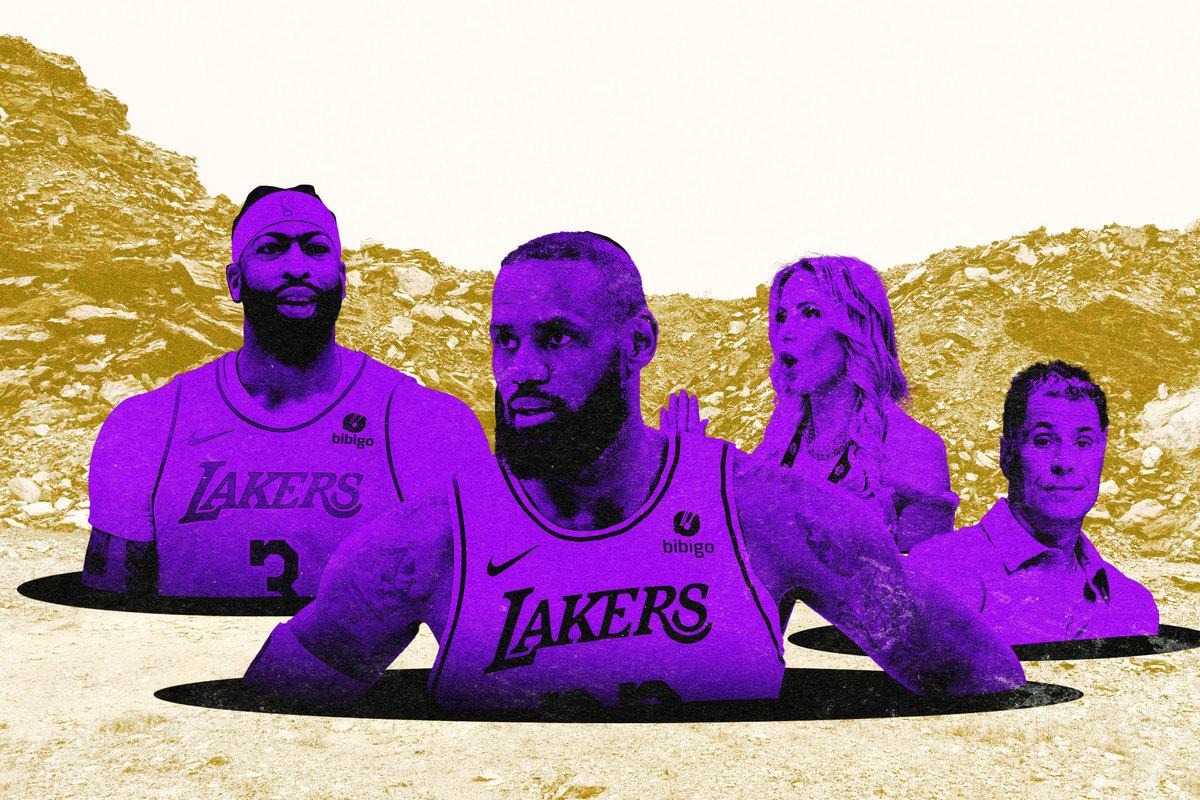
It is not the end times in La La Land, but things appear to stand one Celtics win and a dusting of brimstone away from it. Bitter rivals are frolicking in the front yards of many Lakers faithfuls’ mental abodes. Dan Hurley just dropped a master set of keys to the club like they were molten. Management is on the case, though it may, in fact, also be the perp it’s looking for. Rinse, repeat, insert a generic Magic Johnson tweet, and you’ve got another batch of late-stage Lakers doom. This fan, for one, kindly requests that somebody, anybody—though my preference is the nepo heiress responsible for as many losing seasons in a decade as in the preceding four combined—please, just make it all stop.
A partial list of Laker self-owns in the past six weeks, all of which manage to tread the line between biblical, bewildering, and buffoonish:
- That time when the squad was punked, at an average of five and a half points in five games, by the same studio gangstas that punked them, at an average of six points in four, the year before.
- That time when an unnamed source said the Lakers are viewing a ringless former role player and current podcaster with no coaching experience as comparable to Patrick fucking Riley.
- That other time when everyone in the sport watched Laker management spit game at the best coach in college basketball, only for that coach to ostensibly choose living in Glastonbury, Connecticut (we’ll return to this later), for $20 million less than what they could’ve given him.
- That time when the franchise still didn’t have a head coach 45 days after firing their previous one and reporters started hypothesizing that they didn’t really have a plan B beyond Hurley.
In the natural world there’d be buzzards circling overhead. Today, we’ve got r/NBA, FS1’s morning lineup, and a couple of my shamrock-bleeding coworkers. There is a part of this fandom-spanning reaction that is understandable Laker schadenfreude. There are as many people with reasons to assume the worst about this team as there are those beguiled into assuming something close to the best. (Dream robbing and star chasing to the tune of 32 Finals appearances and 17 championships will do that.) Another part of this, though, is simply uncut gospel truth: Something is broken in the functioning of these recent Lakers, something that their two marquee stars have covered up, in more ways and on more occasions than we are probably capable of perceiving.
The question—of the moment and of the Lakers’ long-term future—is does perception match reality? Is this really as bad as it seems? And the answer, which exists in whispers in El Segundo and that arena that nobody calls “Crypto,” goes something like Mind the cliff, the drop is steeper than it appears. There’s a thin line between has-been and can’t-be. Lineage cushions the fall only so much. Staying on top of this version, of this league, is as much a matter of movement as it is a matter of obstinance. For the Lakers, it’s not that the old ways don’t work, it’s that they no longer suffice.
If recent history is any sign, the guiding philosophy of the LeBron-era Lakers isn’t so much totally faulty as it is wanting or imperfect. Bron is a part of this, but—with a few notable exceptions—indirectly so: It’s his presence and basketball mortality that magnify each and every tactical misstep. Taking a wrong turn isn’t just an error for someone in year 20-something; it is a waste of precious remaining opportunities. And even in the most successful moments of the partnership between the most inevitable franchise in the history of the sport and its most enduring player, there have been plenty of opportunities squandered.
There is, of course, the lowballing and interchanging of coaches. They allowed negotiations with an all-world tactician and ego manager like Ty Lue to fall apart over an embarrassing number of contractual years and dollars at the 10-yard line. (Lue later said of L.A.’s proposed contract, “I just didn’t think I was treated fairly.”) Luke Walton lasted three seasons before he was replaced by Frank Vogel. Vogel made it three years himself before Darvin Ham replaced him. Another two years passed, and the seat was vacant again. Alongside this, role players—the cogs of any dynastic machine—have been devalued financially and schematically. Arguably the best point-of-attack defender in the league walks for free. Three-and-D wings, the products of shrewd acquisitions and player development, are shipped out of town for the collapsed remnants of a former star. (In fairness, the team seems to have shifted its approach in light of the Russell Westbrook debacle, but that doesn’t mean the effects of the transaction don’t continue to take on an afterlife of their own.)
When the Lakers are criticized for their decision-making apparatus, their relatively limited talent base, their roster and culture-building naivete, the company line involves buried craniums and circled wagons. Legends are empowered to heights they have no experience summiting. Agents arrive and carve out practical fiefdoms. When the going gets rough, a Rambis becomes consigliere. Former coaching paramours serve as advisers in future matchmaking.
Sidelines are populated with former Lakers, as is every other effectual portion of the decision-making tree. One year the team styles itself as a defensive juggernaut to staggering effect. Before long, it’s trying (and failing) to primarily embody offensive wizardry. Is it a player-centric franchise whose fortunes are tied to the accumulation of inherited talent disparities? Or an internal development hub where jewels are rendered from lumps of coal? There is a cost to this lack of direction, this top-to-bottom mania. Taken individually these cracks have little effect on L.A.’s foundation, but layer them concurrently, and you have yourself a structure ready to tumble.
They’ve always been, first and foremost, in the business of stars. If there is a through line between every incarnation of these recent teams, it is this learned and inherited heliocentricity, the legacy of Logos and Showtime and Diesels and Mambas. The merit to arranging the Laker universe around the brightest possible objects is straightforward but also, in a way that is often overlooked, particularly shrewd. It guarantees a product that is, at the very least, entertaining and thus financially profitable. And at an even simpler level, star chasing has tilted the balance of the court itself, propelling multiple dynasties and countless championships.
The subtler advantages, though, of star prioritization as a guiding team-building philosophy are that the very act of courting the best players—of openly entreating them to join your brand, not as an emblem but as a partner—serves as an appeal to the next batch of heroes. Paying Kobe $20-plus million yearly to go out on his own, unrelenting terms signals to the generation that followed him that—for better and for worse—the Lakers do not abandon their legends. If you think that a figure like LeBron didn’t take that into consideration when moving out West and that some other dreamer marooned in a flyover franchise isn’t watching how L.A. engages with the Chosen One now, you are allowing the point to coast directly over your head. Particularly in a league where ownership and equity are kept segregated from labor and compensation, treating the best of the best as “stakeholders” is as much about conquering the present as it is about ensuring the future.
The problem with tarring recent Lakerdom is the volatility of this approach and its potential to backfire in ill-suited hands. No amount of mythos can ensure, for instance, suitors of sufficient quality. (See again: the smoldering remnants of the Westbrook trade.) And poaching the big fish from every little pond East and West of the Mississippi doesn’t exactly ingratiate you to the rest of the league. Do it effectively enough, for long enough, and no one will be looking to do you any favors, doubly so when you’re down. Exceptionalism is inherent to the Lakers brand—it is its single most effective selling point—but it is also, in this way, what drives a wedge between them and their peers.
There is, too, the financial cost of these kinds of courtships and commitments, the space where Lakers owner Jeanie Buss and the rest of her siblings’ backgrounds as fiscal inheritors of the team complicates matters even further. Ownership likes to tag the team as a family business. This is true in that it’s no longer the plaything of someone whose wealth was accrued away from the skybox, practice facility, or stadium. For those of us who have never sniffed the kind of gilded existence that the Buss children have inhabited since birth, it is a fool’s errand to imagine what their lives are on a day-to-day basis. But what is certain is that those lives are not blithe about the economic health of the very meal ticket on which their economic status is dependent. It is impossible to view the team’s recent austerity on the margins—a propensity that may have cost it its most recent flirtation—as separate from its commitment to housing the game’s greatest attractions and the economic ramifications of that commitment.
Even if pocket watching isn’t your bag, there is no denying that the choice to center the franchise on its stars can, if left unchecked, have the effect of disempowering other parts of the team-building structure. Who wants to coach a team where they wonder if they’ll ultimately answer, directly or indirectly, to a select few of the figures whose talents they’re being brought in to maximize in the first place? What kinds of failures in roster construction are possible when those with the most immediate stake end up swaying those whose very function is to be, at some level, detached from the present to plan for the future? How do these things backfire, not only scarring the franchise in the present, but also endangering its immediate future? LeBron may just be using his potential free agency like that one-dribble 3-pointer he likes to turn to, but the fact that he’s (indirectly) flexing those muscles, given all the personal disincentives he has for leaving L.A., is an organization-wide failure—one rooted in its inability to satiate its “stakeholders” without overpowering them. There is a way to account for your best players’ preferences, to give them a role in shaping the roster they’ll helm on the court, without so involving them that their judgment and yours are intertwined off it. (And if the tea leaves prove true about the cause and degree of their interest in Bron’s podcast cohost, JJ Redick, for the vacant head-coaching position, that union won’t exactly throw water on this point.) There are many reasons for the decay of these current Lakers, from top to bottom, but none are more apparent than the team’s pattern of shoddy boundary planting between different sectors of the org chart.
Parse through the franchise’s greatest victories, and it’s clear this need not be a binary. Showtime doesn’t air without the right supporting cast. Shaq and Kobe’s twin suns didn’t burn out when Phil Jackson entered the fold. That Game 7 in 2010 doesn’t enter Laker lore if Mitch Kupchak doesn’t allocate $33 million to pick up Ron Artest. Particularly now, with a CBA that functions to dissuade and limit the age-old three-star model, ultimate success is as dependent on a team’s ability to find and keep stars as it is dependent on fashioning a full system to orbit around them. Call it justice or small-market karma or a shadow hard cap, but central to the bed the team finds itself in is the fact that the bed exists because of how it exploited the old system. How it pulled beaming objects out of the sky.
There is a chance, of course, that the Lakers know this. That their pursuit of Hurley, firing of Ham, reaction to the postseason flameout, and prolonged courtship of Redick are all linked by a common desire to escape stagnation while holding on to what’s always worked for them. You don’t have to be a mystic to recognize that it’s in everyone’s interest to treat this as an existential threat to the Lakers—even if it might not be—because the Lakers are the most existentially enamoring subject in the sport. (Even during someone else’s Finals. Even in failure.) This has been true, more often than not, for as long as the league has existed. When it comes to the purple and gold, there’s always a point on which to pivot. That swings both ways, though. The only thing that stokes as much of a reaction as the idea that the Lakers don’t know what they’re doing is the idea that they might find out.

